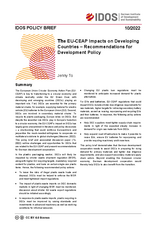Policy Brief
The EU-CEAP impacts on developing countries – recommendations for development policy
To, JennyPolicy Brief (10/2022)
Bonn: German Institute of Development and Sustainability (IDOS)
DOI: https://doi.org/10.23661/ipb10.2022
The European Union Circular Economy Action Plan (EU-CEAP) is key to transitioning to a circular economy and climate neutrality under the EU Green Deal, with developing and emerging countries (DECs) playing an important role. First, DECs are essential for the primary material chains, for example, supplying material for electric vehicle (EV) batteries to the European Union (EU). Second, DECs are involved in secondary material chains: To recycle its plastic packaging, Europe relies on DECs. But despite the essential role DECs play in Europe’s transition to a circular economy, the EU-CEAP’s impact on DECs has largely gone unexamined in literature and policy discourses – a shortcoming that could reinforce Eurocentrism and jeopardise the much-needed willingness to cooperate on multilateral solutions to global challenges (Messner, 2022). This policy brief and associated discussion paper (To, 2022) outline challenges and opportunities for DECs that are related to the EU-CEAP and present recommendations for German development cooperation. In the plastic packaging sector, DECs will likely be impacted by stricter waste shipment regulation (WSR), along with higher EU recycling targets, mandatory recycled content for plastics, and bans on certain single-use plastic items. Hence, the following recommended policy actions:
• To lower the risks of illegal plastic waste trade and disposal, DECs must be helped to enforce the WSR and meet tightened import regulations.
• The impact of plastic waste imports on DEC domestic markets in light of changing WSR must be monitored; discussion about stricter EU waste export regulations should be initiated accordingly.
• In response to plastic waste imports, plastic recycling in DECs must be improved by raising standards and investments in advanced machinery as well as working conditions for informal labourers.
• Changing EU plastic ban regulations must be monitored to anticipate increased demand for plastic alternatives.
For EVs and batteries, EU-CEAP regulations that could impact DECs include stricter due diligence requirements for raw materials, higher targets for retrieving secondary battery materials, as well as reusing, repurposing and recycling EVs and their batteries. In response, the following policy actions are recommended:
• Help DEC suppliers meet tighter supply-chain require-ments in light of the expected steady increase in demand for virgin raw materials from DECs.
• Help expand road infrastructure to make it possible to reuse EVs, ensure EV batteries for repurposing, and provide recycling machinery and know-how.
Contact
Cornelia Hornschild
Publication Coordinator
E-mail Cornelia.Hornschild@idos-research.de
Phone +49 (0)228 94927-135
Fax +49 (0)228 94927-130
Alexandra Fante
Librarian/ Open Access Coordinator
E-Mail Alexandra.Fante@idos-research.de
Telefon +49 (0)228 94927-321
Fax +49 (0)228 94927-130




![[Translate to English:] Photo: Alexandra Fante, Bibliothekarin/Open Access-Koordinatorin](/fileadmin/_processed_/f/0/csm__c_Deutsches-Institut-fuer-Entwicklungspolitik_Fante_94ce4fa1ba.jpg)